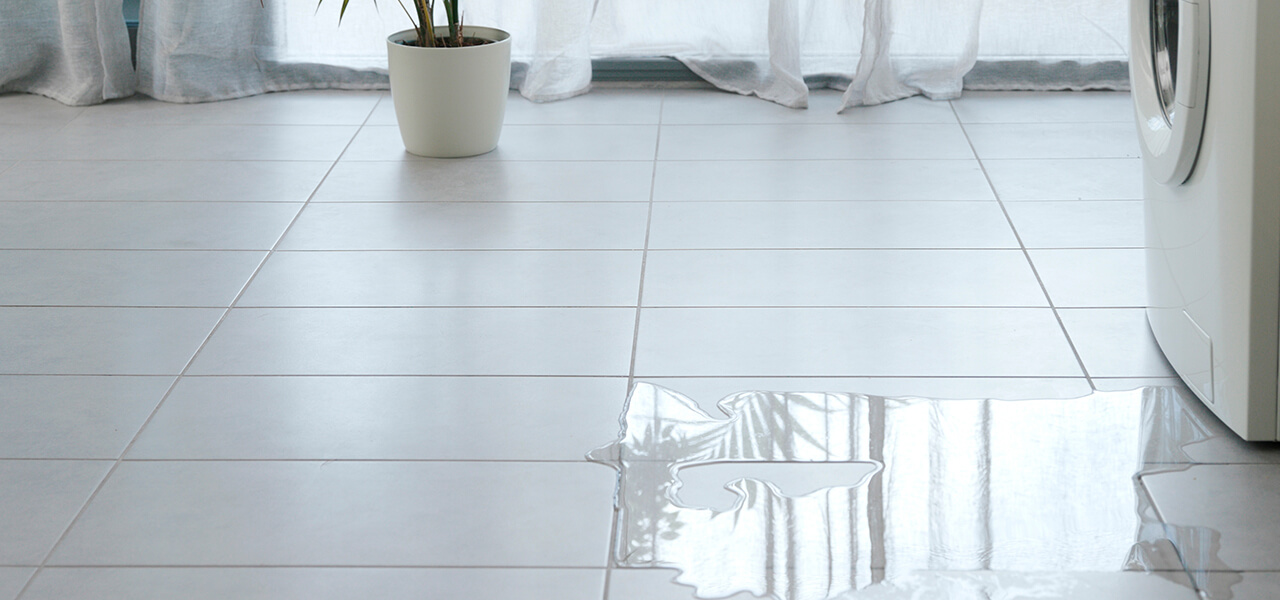Why is my washing machine leaking?
A washing machine leak isn’t only inconvenient, but it can be damaging to your appliance and home. Finding the cause of your leak, fixing it, and taking preventable measures to prevent leaks can help rectify the situation.
If you find your washing machine has a leak but you can’t find out why, contacting one of our washing machine repair teams can help resolve the issue.

Common causes of a leaking washing machine
If your washing machine has a leak, finding the cause quickly is important. There are a couple of common problems that could be causing your washing machine to leak water.
Depending on where your washing machine is leaking from, there could be different causes. Fixing the issue at the source is important to keep your laundry clean, your appliance working efficiently, and your home leak-free.
Some common washing machine leaks include:
Washing machine leaking from underneath
A washing machine leak from underneath can be damaging to your home, especially if it goes unnoticed for some time. Leaks under your washing machine are usually caused by a hole in the water pump or an internal leak with your drainpipe. Equally, if your hoses become twisted, kinked, or bent, they can become damaged.
If you’re experiencing leaks under your washing machine frequently, it is important to seek help from a professional. Our team of repair specialists can get your washing machine working again.
Washing machine leaking from the door
Your washing machine might be leaking from the door due to a problem with your door seal. If you notice water leaking from the door, you will need to check your rubber door seal for any tears, blockages, or disruptions. Take a damp cloth and rub the door seal to remove any debris and dirt that might be on the outer lip or caught in the fold. You can also gently lift back the fold to see if anything is lodged or blocking the seal.
If you notice a tear or rip in your door seal, or you persistently have issues with your door leaking, you should replace the door seal.
Diagnosing a washing machine leak
Finding the source of your washing machine’s leak is the most important part of repairing it. Not only can a leak damage your appliance, but it can also compromise its cleaning ability and potentially cause further damage to your home.
Some common ways to diagnose where your washing machine leak is coming from include:
Checking for leaks during the wash cycle
Noticing when your washing machine is leaking can be a big indicator as to what is going wrong. If you're noticing leaks during your wash cycle, it is likely an issue with your water hoses or seals. This could be anything from poor installation to a tear in the part. Replacing or reinstalling your machine's hoses or seals could help the issue. If you're still finding problems with your washing machine leaking during its wash cycle, you might want to contact a professional or plumber for help.
Inspecting the washing machine drain
If your washing machine is leaking or draining improperly, it's important to check the drain pump filter. If it becomes blocked or full, your washing machine might struggle to distribute the water it uses, resulting in leaks further down the line.
It is good maintenance to check and clean your washing machine drain pump filter regularly. This can help prevent blockages and leaks, as well as remove any musty smells in your drum. Items such as bobby pins, buttons, and even money can get lodged in your drain pump filter, so removing these regularly is important.
Looking for pooling water
One way to know for certain that your washing machine isn't working as intended is if you find pooling water. Whether this is beneath your washing machine or caught in the drum, excess water could indicate an issue with your machine. Checking the common problem spots for leaks can help rule these parts out. If you're still unsure where the water is coming from, a professional can help you identify it.
Fixing a leaking washing machine
A leaking washing machine can have many causes, from an uneven appliance to a problem part. Finding the issue can help you stop the leak, clean up the mess, and keep your washing machine working at its most efficient.
A couple of steps you should take when fixing a leaking washing machine is:
Dealing with a dripping washing machine
Firstly, you'll need to deal with the water issue. Whether it is a large leak or a small one, water can do further damage to your appliances and home if left unattended. Make sure you have something absorbent nearby to mop most of the water-this can be a towel or something similar. You should keep a towel and a bucket nearby throughout the fix to catch any additional water.
Repairing a washing machine leaking water
Repairing your washing machine might mean replacing a part, reinstalling the plumbing, or levelling your machine. Once you've found the problem, quickly rectifying it is important. If you're struggling to find the problem or fix the leak, or your washing machine is still leaking after it has been fixed, you will want to call a professional to help resolve the issue.
Preventing future washing machine leaks
While leaks aren't always preventable, there are a few steps you can take to reduce the risk of your washing machine leaking. Taking proper care of your appliance can better extend the longevity of your washing machine and further prevent the likelihood of leakage.
Some steps to prevent leaking include:
Proper loading and maintenance
Loading your washing machine correctly can have many benefits. Not only will you get the best cleaning for your clothes, but it can also prevent your appliance from unnecessary wear and tear. Balancing your drum and taking extra consideration for what you’re putting into your drum can help prevent leaks.
Careful maintenance can also help. Not only can regular cleaning help prevent blockages, but it can also help as an early indicator for any issues within your washing machine. Regularly checking, cleaning, and maintaining your appliance can help you catch issues early before they become a bigger problem.
Replacing worn-out components
From your door seal and hinges to waste pipe, if you notice a part of your washing machine is experiencing wear and tear, it is best to replace it before it becomes an issue. These parts can be easily replaced, or you can have a professional do it for you.
If you own a Beko washing machine, you can find spare parts here.
Checking hoses and connections
Regularly checking your hoses and connections can help prevent leaking. One main cause of leaks is from a hose tear or poor, or loosening, connection. Making sure both your water inlet and waste pipe are connected correctly can stop water damage from happening behind and below your washing machine.
If you’re struggling to connect your hose to the main supply correctly, seek professional help.
When to call a professional for a washing machine leak
While a washing machine leak can sometimes be solved easily, there are times when contacting a repair team or professional can be useful. A broken-down washing machine isn’t convenient, and you don’t want to be struggling with your washing machine regularly.
If you’re experiencing these things, it might be time to call a professional:
Washing machine leaking from the bottom
If your washing machine is leaking from the bottom, it might be a problem with the plumbing. While you can potentially find a fix, it is always best to contact a washing machine repair specialist to help in these instances. Not only can they find the problem, but they can solve it quickly to ensure the least water damage to your home.
Severe or persistent leaks
If your appliance is leaking regularly, no matter what you do, then calling a professional is a must. There might be something unseen causing the leak, and having the expertise of a repair team can get your washing machine working efficiently again.
Severe leaks can also indicate a bigger issue or cause further problems to your home and appliances.
Leaks with an unknown cause
You should call a professional if you're struggling to identify the cause of your washing machine's leak. Unknown causes could be hidden further in the appliance's body or more complicated to resolve. To prevent further damage to your home and appliance, don't use your machine, and contact someone who can help.
Leaking washer FAQs
Why is water leaking from the bottom of my washer?
A leak from the bottom of your washing machine could be due to faulty hoses and connectors or an unlevel machine. Ensure your appliance is on a flat surface and adjust the legs if necessary to make it level. Then, check your water inlet and waste hoses for any tears or damage, and make sure all connectors are secure and correctly placed.
Is it normal for a washing machine to leak a little?
Your washing machine should not be leaking. If you're noticing a water leak, then something in your appliance likely needs repairing. A small puddle of water might mean a small repair, whereas a larger pool of water indicates a more complex problem. It's important to distinguish between a leak and condensation, so check your machine and the surrounding area regularly for pools of water, especially after a cycle.
Can a leaking washing machine be fixed?
Yes, a leaking machine can be fixed. Most issues are caused by common wear and tear and can be easily sorted with a replacement part or reinstallation. Larger leaks might suggest a more complex problem. It is important to contact a professional for further advice if you cannot solve the leak yourself.
How much does it cost to repair a leaking washing machine?
The cost of fixing a leaking washing machine can vary depending on the required repair. Simple adjustments like levelling the machine or reconnecting loose connectors are typically free while replacing small parts like a door seal might be relatively inexpensive. However, larger issues such as unidentified leaks can be more costly. The average cost of repairing a machine pump is around £100.
See our parts listings for an idea of how much it will cost.
If water is leaking from the appliance you will need to stop using it as soon as possible. If you can, try to identify where the leak may be coming from. If the issue is related to plumbing, such as burst or cracked pipes, you will need to contact a plumber to come out and fix the problem. Please find our contact details by clicking here.
Did we answer your question?
We are so sorry we were unable to answer your question. You might be able to find the answer you are looking for in the ‘Related Questions’ below. If your query is still unanswered, please head over to our Contact Us page for further assistance.
Search FAQ’s
Search or browse our frequently asked questions to find the answer to your query.




